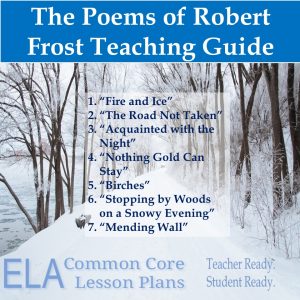An analysis of poetry by Robert Frost unveils great lines of poetry. The following Robert Frost quotes come directly from his poems.
Here’s a symbolism in the poems of Robert Frost lesson plan.
Robert Frost Quotes

You want to teach Frost but you’re afraid of an ice cold reception because you don’t have enough time to prepare a great lesson? No worries. These Robert Frost poetry lesson plans are ready to use.
Use these quotes as part of your analysis of poetry by Robert Frost.
Poem: “The Road Not Taken”
Quote: Two roads diverged in a yellow wood (1).
Analysis: A common theme in many of Frost’s poems is the importance of choices and their far reaching consequences. These two roads represent a difficult choice.
Quote: “Two roads diverged in a wood, and I– / I took the one less traveled by, / And that has made all the difference (14-16).
Analysis: Many mistakenly refer to the poem as “The Road Less Traveled” on account of these lines. What I’d like to draw your attention to is the dash at the end of line 14. It marks an abrupt change, a change in thought, an Orwellian doublethink. Previously the paths are described as being “worn really about the same” (10). Now, after sighing and lamenting his choice, he makes an abrupt change in thought, a rationalization. Pay attention to dashes.
More Robert Frost Quotes
Use these quotes as part of your analysis of poetry by Robert Frost.
Poem: “Birches”
Quote: “One could do worse than be a swinger of birches” (60).
Analysis: Frost is the master of meiosis (see the “Fire and Ice” analysis from this series). The poem extols the merits of being a swinger of birches, building up to the ultimate assessment that there’s nothing better on Earth to be, and then adding an understatement for further emphasis.
Poem: “Mending Wall”
Quote: “Good fences make good neighbors” (last line).
Analysis: This line is uttered twice by the neighbor who seems to think having a wall is a good idea based on what his father told him. The poem’s speaker, however, disagrees, yet goes along with the exercise. Frost questions conventional thinking.
Quote: “Something there is that doesn’t love a wall” (1).
Analysis: Frost asserts that walls are innately evil; there’s something about them that prevents brotherhood. The wall represents fear, hatred, bigotry, anything that prevents humans from joining together.
